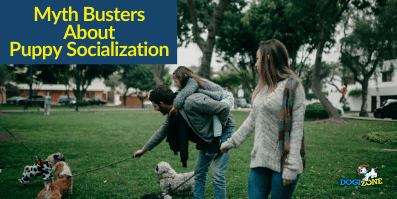Myth Busters About Puppy Socialization
There are, unfortunately, a lot of myths and misunderstandings about training dogs, with a lot of these myths around puppy socialization as well as actual obedience work with puppies of all ages.

Myth: Puppies are naturally friendly and socialized
It is true that puppies are naturally socialized with their littermates, mother, and the breeder or owner of the dogs, they are not socialized with new owners, visitors, other dogs, and pets in the home and in the surrounding areas.
Puppies go through different phases, including fear stages, and stages where they begin to test dominance and submissive types of behaviors. Failing to socialize the puppy in these critical phases can result in dogs that are fearful, aggressive, or very submission as they mature. Regular, consistent, and positive experiences with other puppies, dogs, animals, and people are critical throughout a dog’s life, and cannot be ignored throughout their time as a puppy.
Myth: Puppies grow out of bad behaviors
Bad behaviors such as chewing, biting, jumping up on people, or simply ignoring people and doing their own thing during training times are problem behaviors that need to be addressed. Allowing a puppy to continue on with these bad behaviors creates a dog who uses these behaviors, which is one of the reasons dogs are left at shelters or given away.
Correcting a puppy before they learn a problem behavior is much easier than trying to change the behavior of a juvenile or mature dog. The great news is that training a puppy to stop behaviors is very effective, and can be done using only positive training methods, ensuring your dog grows up using the behaviors you want, not the ones you do not.
Myth: Going to the dog park is all the socialization a puppy needs
Socialization is more than just being around other dogs and puppies. Going to a dog park or going for a walk and encountering other dogs is part of socialization, but it is not everything the puppy needs.
A well-developed puppy socialization program includes meeting new people, going to different locations in and around your area, as well as meeting other animals. The more interactive and unique the socialization is for the puppy, the more comfortable the puppy will be in the future when going to new places.
Myth: Puppies need to be at least 6 to 8 months old to be socialized
This is a very common myth, but it is also very incorrect. Puppies can be socialized in structured training classes and one-on-one interactions as soon as they have completed their first set of vaccinations, which should be no later than 8 weeks of age.
At Dogizone, we offer different grooming, socialization, and training programs for very young puppies as well as older puppies. Continuing with our structured programs helps busy owners to ensure their pets are well-socialized and trained using positive training methods and experiences.
Myth: All puppies develop at the same speed
Not all puppies learn and develop at the same speed. This is not just their physical growth, but their ability to mentally engage for training and socialization activities. Our staff can work with the puppy at his or her current level, and develop a customized training and socialization plan to maximize your puppy’s adjustment and behavior based on his or her development.
At Dogizone, we offer a package that includes puppy grooming, training, and socialization. This is an ideal package for busy puppy owners, or for those who want to ensure their puppy is off to a great start to being a well-behaved and socialized dog.

